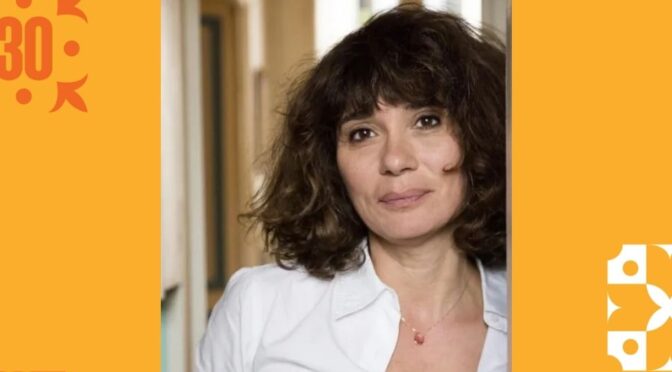
Zjistěte více o dojemnem románu o osudu obyvatel jednoho pařížského domu ve 40. letech 20. století.
Kdy: 17. května 2025, 16:00
Kde: Sál Milana Kundery, Výstaviště Praha Holešovice, Křižíkovy pavilony
Přidejte se k nám na Knižním veletrhu v sobotu 17. května v 16 hodin na setkání se spisovatelkou a režisérkou Ruth Zylbermanovou, která nám představí svůj román Autobiografie jednoho pařížského domu (209 rue Saint-Maur, Paris Xe : Autobiographie d’un immeuble, Points, 2021), jehož český překlad vydalo nakladatelství Maraton v roce 2024. Ve vyprávění Ruth Zylbermanové ožívají příběhy zmizelých i navrátilců, dětí i dospělých, kolaborantů i odbojářů, zamilovaných dívek i žen se špatnou pověstí, konkrétních lidí různých národností, jejichž životy svedla dohromady jedna pařížská adresa. Po diskusi bude následovat autogramiáda s autorkou na stánku Francie.
Ruth Zylbermanová, francouzská filmařka a spisovatelka, natočila řadu dokumentárních snímků a v roce 2015 vydala svůj první román La Direction de l’absent (Směr nepřítomných). V její tvorbě se zřetelně projevuje vztah ke středoevropským dějinám: dokumentární snímek Dissidents, les artisans de la liberté (2009) věnovala mj. Václavu Havlovi, Le procès – Prague 1952 (2021) pak trojici odsouzených: Rudolfu Slánskému, Arturu Londonovi a Rudolfu Margoliovi. V roce 2018 natočila dokument Les Enfants du 209 rue Saint-Maur, Paris Xe (Děti z ulice Saint-Maur 209, Paříž, 10. obvod), který posloužil jako předloha románu z roku 2020. Snímek i kniha si získaly značnou přízeň odborné i čtenářské obce.
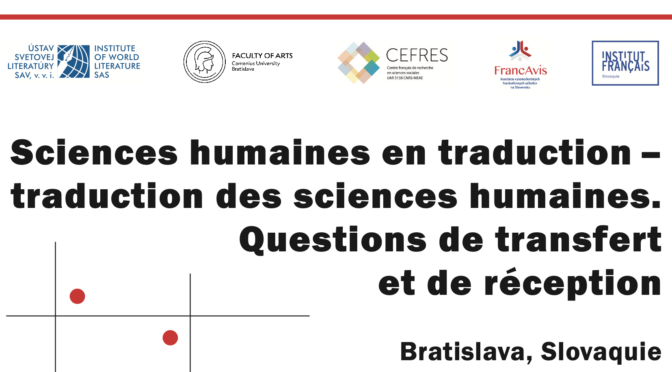
Kdy: 15. a 16. května, 2025
Kde: Ústav svetovej literatury SAV, Bratislava, Slovensko
Jazyk: francouzština, angličtina
Organizační tým: Katarína Bednárová, Silvia Rybárová, Ján Živčák (Ústav svetovej literatury SAV)
Odkaz na výzvu k podávání přihlášek zde
Kompletní program v angličtině ke stažení zde.
Oficiální plakát zde.
Mezinárodní konferenci společně pořádají Ústav svetovej literatury SAV (Bratislava), Filozofická fakulta Univerzity Komenského v Bratislavě a CEFRES.
Foto: Mgr. Lucia Drotárová, PhD. Vytvořeno pomocí nástroje AI.
Program
Pokračování textu Překlad humanitních a společenských věd | Symposium →
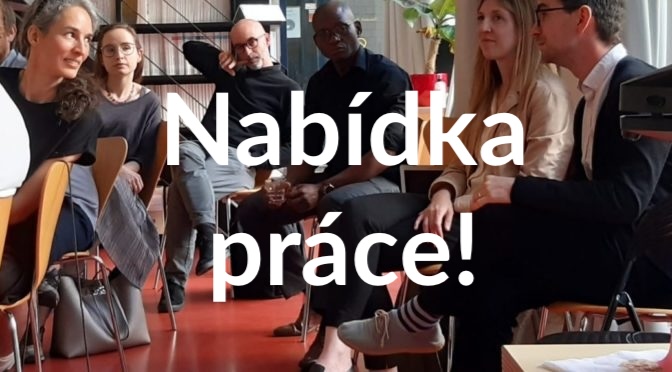
CEFRES je :
- veřejná francouzská výzkumná instituce, která má navázaná partnerství po celé střední Evropě
- mezinárodní administrativní a vědecký tým (skládající se v roce 2024 z dvanácti národností), který je špičkou ve výzkumu v humanitních vědách
- dvacet vědců a padesát vědců přidružených
- padesát akcí ročně
- dvacítka grantů
Úkoly :
- plánování příspěvků sociálních sítí ve spolupráci s administrativní částí týmu
- správa trojjazyčné internetové stránky střediska CEFRES, cefres.cz (ve WordPressu)
- tvorba obsahu příspěvků na sociální sítě (Facebook, Instagram, X, LinkedIn), a to v několika jazycích
- tvorba vizuálního obsahu (internetové stránky, sociální sítě, plakáty a programy vědeckých a kulturních akcí)
- analýza výstupů statistik, na jejich základě navrhování strategie
Očekávané dovednosti :
- výborná znalost češtiny (C2), francouzštiny (C1 nebo B2) a angličtiny (C1 nebo B2)
- zevrubná znalost sociálních sítí a jejich nástrojů strategického monitoringu
- zkušenosti s překladem
- zkušenosti se správou webu
- zkušenosti s tvorbou grafiky, ideálně též s úpravou videa
Požadované vlastnosti :
- schopnost práce v týmu
- schopnost komunikovat a rychle reagovat
- výkonnost, schopnost formulace kvalitního textu
- cit pro estetiku
- spolehlivost a samostatnost
Požadovaný profil :
- studia v oblasti komunikace / digitálního marketingu / lingvistiky či zkušenosti na obdobné pozici
- zájem o marketing a překlad
- zájem o humanitní vědy je vítán
Podmínky zaměstnání a benefity :
- smlouva na dobu určitou (1 rok) s možností prodloužení
- zaměstnání na částeční úvazek dle českého pracovního práva a podle potřeb kandidáta / kandidátky: 12-20 hodin týdně
- časová flexibilita a alespoň jeden pevně určený den fyzické přítomnosti v CEFRES
- hrubá mzda 12-20 000 CZK
- 9-14 dní placené dovolené
- dlouhá letní přestávka, kdy se nekonají vědecké akce
- kurzy francouzštiny pro všechny úrovně na Francouzském Institutu v Praze hrazené střediskem CEFRES
- kanceláře v centru Prahy ; adresa : Na Florenci 3, Praha 1
- vstup zdarma do Kina 35 na Francouzském Institutu v Praze
Podmínky zaslání kandidatury :
- nástup nejpozději 1. 10. 2024
- životopis a motivační dopis zasílejte na claire.madl@cefres.cz a do předmětu uvěďte Candidature au poste de chargé/e de communication et de traduction, do kopie mailu zadejte adresu mateusz.chmurski@cefres.cz
- K pohovoru ve francouzštině budou pozváni pouze vybraní kandidáti/ky.
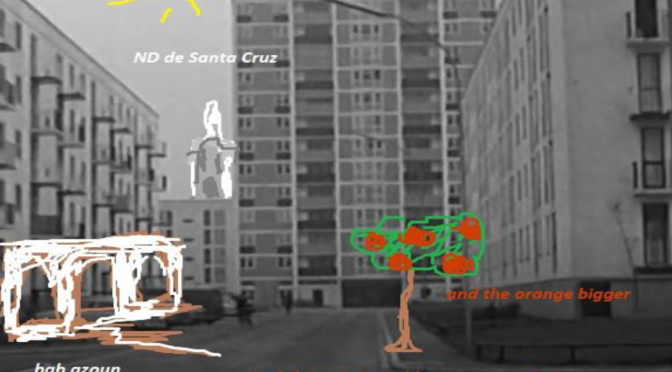
“Nikdy jsme o tobě nemluvili, ale vždy jsi tady bylo Alžírsko.” Vyhnanství a vzpomínky na zmizelé světy
Šesté setkání Interního semináře CEFRESu v roce 2022-2023.
Cílem semináře CEFRESu je představit probíhající výzkum členů CEFRESu a otevřít tak mezioborovou diskuzi o otázkách týkajících se metod, přístupů a koncepcí, díky které bude moci každý účastník porovnat vlastní pohled s předloženými pracemi.
Kde: Knihovna CEFRES a online
Kdy: úterý 14. března 2023, 16:30
Jazyk: angličtina
Kontakt: cefres[@]cefres.cz
Michèle Baussant (CNRS, CEFRES/ Institut Convergences Migrations)
Diskutant: Emina Zoletić (CEFRES / Varšavská univerzita)
Pokračování textu Vyhnanství a vzpomínky na zmizelé světy →

Krajiny se stíny. Představení výzkumného projektu Luby Jurgenson
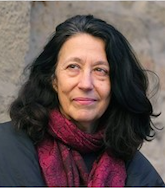
V červnu, červenci a srpnu 2022, výzkumnice, spisovatelka a překladatelka Luba Jurgenson, profesorka na Sorbonnské univerzitě a ředitelka Eur’ORBEM, bude hostující výzkumnou pracovnicí v CEFRES. Bližší informace ohledně její biografie naleznete zde.
Kdy: čtvrtek, 30. června, 10:30 – 12:00
Kde: Knihovna CEFRES, Na Florenci 3, Prague a taky “online” – odkaz na Zoom na vyžádání (cefres@cefres.cz)
Jazyk: angličtina
Pokračování textu Krajiny se stíny →
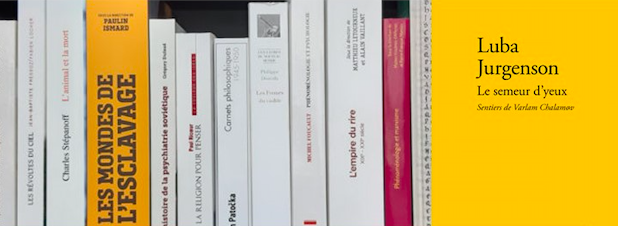
CEFRES Knižní revue
V rámci této speciální edice naší CEFRES Knižní revue, se potkáme s Lubou Jurgenson, profesorkou ruské literatury na Sorbonnské univerzitě, ředitelkou ústavu Kultur a společností východní, jižní a střední Evropy (Eurorbem), překladatelkou, autorkou románů a esejí a šéfredaktorkou edičních řad v různých nakladatelstvích, u příležitosti vydání jejího nejnovějšího díla.
Kdy: úterý, 28. června v 15:30
Kde: Knihovna CEFRES, Na Florenci 3, Praha 1 (pro online připojení nás kontaktujte na: cefres@cefres.cz)
Jazyk: francouzština
Pokračování textu Speciální knižní revue – červen 2022 →







